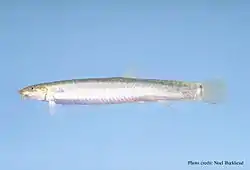泥鰌
Japanese

| Kanji in this term | |
|---|---|
| 泥 | 鰌 |
| Grade: S | Hyōgaiji |
| Irregular | |
Etymology
Unknown. Historical sources from the Muromachi period spell this in kanji as 土長, and in historical kana as どぢやう (dodyau). Spellings such as どぜう (dozeu) were apparently later innovations.[1][2]
Theories suggest that the name may refer to the fish's apparent ability to thrive in muddy conditions. The modern kanji spelling is an example of jukujikun (熟字訓).
Alternative forms
Noun
泥鰌 (hiragana どじょう, katakana ドジョウ, rōmaji dojō, historical hiragana どぢやう, historical katakana ドヂヤウ)
Usage notes
As with many terms that name organisms, this term is often spelled in katakana, especially in biological contexts, as ドジョウ.
References
- 1988, 国語大辞典(新装版) (Kokugo Dai Jiten, Revised Edition) (in Japanese), Tōkyō: Shogakukan
- 2006, 大辞林 (Daijirin), Third Edition (in Japanese), Tōkyō: Sanseidō, →ISBN
Further reading
- Etymology at Nihon Jiten (in Japanese)
- Etymology at Gogen-Allguide (in Japanese)
This article is issued from Wiktionary. The text is licensed under Creative Commons - Attribution - Sharealike. Additional terms may apply for the media files.